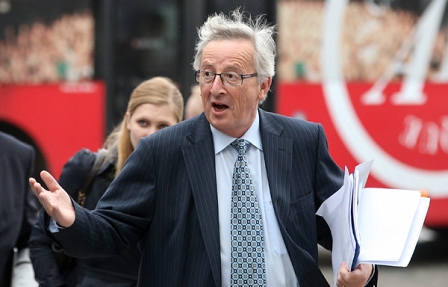Erstellt am: 29. 5. 2014 - 11:23 Uhr
Don’t let Europe’s citizens down!

Emmanuel Sigalas
Dr. Emmanuel Sigalas Assistant Professor of European Politics at the Institut für Höhere Studien, Wien. He is originally from Athens.
These European elections were different. For the first time ever there were top candidates coming from the European level political parties (with a few exceptions). For the first time there was a debate between the candidates that was televised simultaneously across Europe. For the first time voters’ choice seemed to matter with regard to who will be the next president of the European Commission.
However, all this will be for nothing, if the national government leaders fail to endorse Jean-Claude Juncker’s candidacy. Mr Juncker’s party got most seats in the European Parliament (EP), but this still doesn’t guarantee him the Commission’s presidency.
The Lisbon Treaty reserves the right of nominating the Commission president to the European Council, composed of the heads of the EU’s member states, but it also states that it should take into account the election results. Since the European People’s Party (EPP) won the elections, the European Council cannot propose a candidate who does not come from this political camp. However, this doesn’t mean that it has to be the EPP’s top candidate. In theory, it could be just about anyone from the EPP! The European Parliament decided to take advantage of the Treaty’s vagueness on this point and resolved that the next Commission president should come from the party winning most seats in the elections.

EPA/OLIVIER HOSLET
If you think that the EP is nothing more than a talking shop where politicians go to before they retire, then think again (well, there is some truth in the last part). The EP is a co-legislator with the Council of Ministers and that means most EU legislation, in other words, important legislation affecting the lives of millions around the world, is decided jointly by the Council and the EP. Equally, when it comes to the election of the Commission president the European Council and the EP have roughly equal powers. In practice this means that the European Council proposes the president of the Commission and the EP has to approve of him or her. Consequently, if the European Council proposes a candidate other than Mr. Juncker, then the EP can block the decision.
The Treaty doesn’t specify what happens if the European Council and the EP are persistently at odds on this matter, but a new round of European elections is extremely unlikely. Normally the EP and the European Council come to an agreement before a candidacy is put to vote. This saves embarrassment on both sides. However, this is the first time the EP has been explicit in advance about its preferences, and these seem to run against the wishes of some national governments (especially of Britain and Hungary).
_edited_body.jpg)
GNU Free Documentation License
Luckily enough the European Council will propose a candidate on the basis of qualified majority. This means that Britain’s Prime Minister will need the support of several EU member states (because of the complex decision-making formula, it is difficult to give a definite number, but a blocking minority can be formed with as few as 3 countries), in order to exclude the candidacy of Mr. Juncker. Should he however succeed, this would be a blow for democracy and for the EU. It will be a humiliation for the EP and an offence to the European citizens who thought that the EP elections can make a difference.
The EU has been suffering from bad press and the democratic deficit has had a role to play in this regard. If the Commission is the equivalent of a government at the European level, then Europe’s citizens should have a say about who runs this government. The EP’s effort to link voters’ choice with the Commission president choice was an ingenuous yet clever effort to close the gap between citizens and the EU.
Let me be clear on one thing. I don’t think this is enough to make the EU fully democratic and it will not solve all its unpopularity issues, but it is a step in the right direction. If the national government leaders do not understand it, they condemn the EU to stagnation and depreciation. If they do and they still insist on opposing Mr. Juncker’s candidacy, they undermine the importance and legitimacy of the European elections. In other words, they alienate the European citizens from what is going on around them - a perfect strategy for promoting what’s worst in politics: apathy and extremism.

